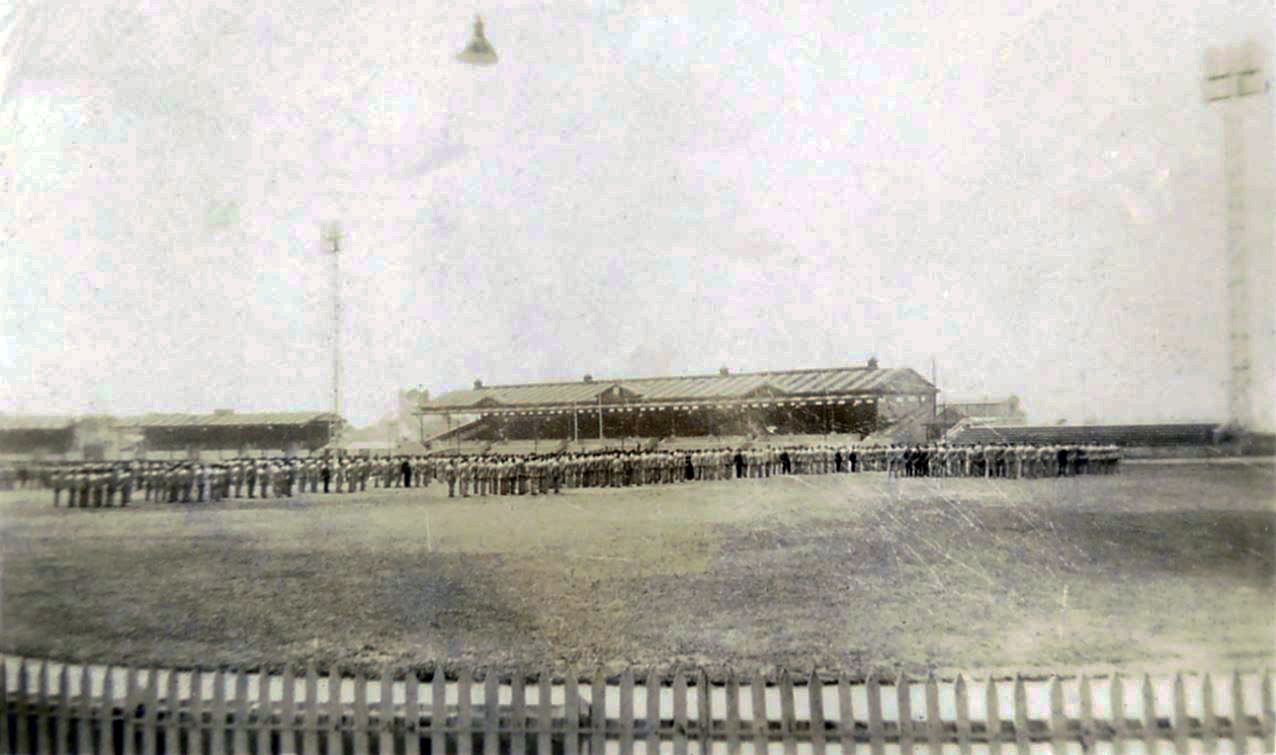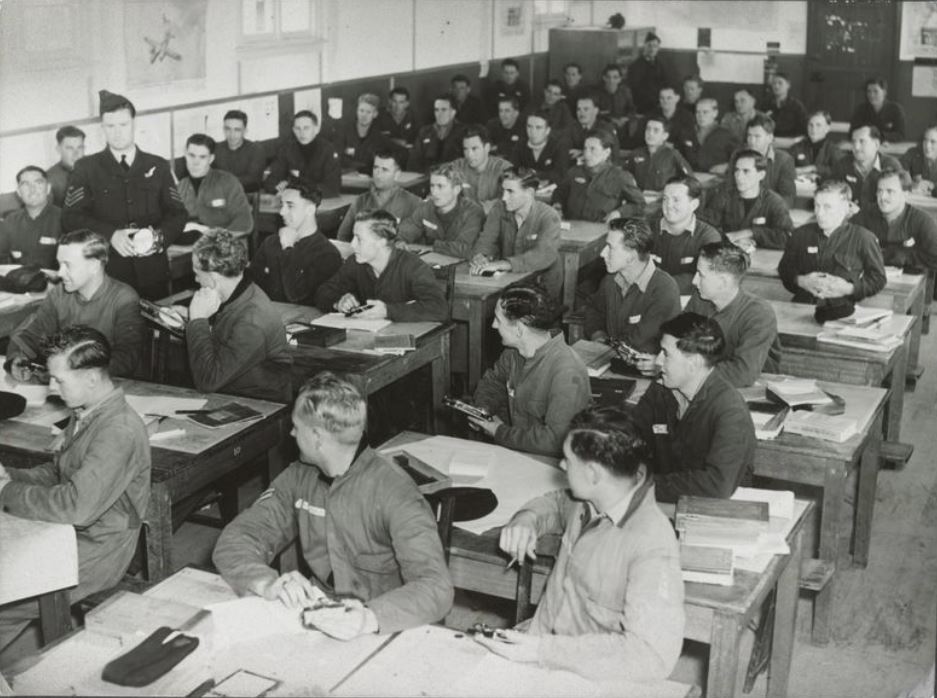Difference between revisions of "No. 1 Engineering School RAAF"
From Our Contribution
(→Trainees) |
(→Staff) |
||
| Line 29: | Line 29: | ||
===Staff=== | ===Staff=== | ||
* [[William John Martin (16379)]] ?? ??? ???? - 23 Feb 1942 | * [[William John Martin (16379)]] ?? ??? ???? - 23 Feb 1942 | ||
| + | * [[Bernice Lydia Hand]] 2 Sep - 21 Oct 1944 | ||
===Trainees=== | ===Trainees=== | ||
Revision as of 00:52, 19 April 2024
 Possibly a contingent of RAAF trade trainees at Melbourne Showgrounds in 1940. | |
 | |
Brief History
No. 1 Engineering School was formed on I Mar 1940 at the Melbourne showgrounds at Ascot Vale and later overflowed into Flemington racecourse. The School grew quickly and by December, 205 courses had commenced, with 2,600 trainees and 700 airmen and airwomen and 40 officers on staff. Training on Wirraway aircraft commenced in March 1941 and included RNZAF personnel. Courses started in April included those for cooks, drivers and intelligence officers. A milestone was reached in September when the total number of personnel completing training passed 10,000.
There were an increasing number of airwomen under training, especially as wireless telegraphists. This resulted in female officers being posted in during March and by September there were 500 airwomen under training. By August 1942, 20,000 trainees had graduated, and in December 270 WAAAF telegraphists took part in a passing out parade. New courses commenced in 1943 included electrician instruments, instrument maker and fabric worker, reflecting the difficulty of recruiting personnel in specialist trades. Training for naval personnel on Allison c11 Engines commenced, as well as for WAAAFs as trainee flight mechanics. During 1943 over 12,000 tradesmen and women completed courses. Courses commenced in diesel mechanics for United States Army personnel in January 1944, and basic fitters courses for Netherlands East Indies (NEI) personnel in Apr 1944. The first WAAAF fl1ght mechanics graduated 1n April and two more courses commenced, a pattern which continued all year. By November 1944 50,000 trainees had graduated from the School. This heavy workload continued into 1945, and as fewer suitable candidates enlisted, some courses had high failure rates, not helped by a shortage of textbooks.
With the approaching defeat of the Japanese, Japanese language course commenced in August 1945. With the Japanese surrender courses and training quickly came to a halt. From November, mass discharge of personnel commenced, and the removal of assets to the new training hub at Wagga Wagga began.
Staff
- William John Martin (16379) ?? ??? ???? - 23 Feb 1942
- Bernice Lydia Hand 2 Sep - 21 Oct 1944
Trainees
- William John Martin (16379) 5 Jun 1940 - ?? ??? ????
- Vernon Wallace Marsh 19 Oct 1941 - 26 Jan 1942
- Harry Beard 11 Apr - 26 Jul 1940
- Reginald Thomas Blackman 26 May - 12 Sep 1940
- Edward Arthur Ross 1 Mar - 5 Jul 1940 & 23 Oct 1941 - 15 Feb 1942
- Edward Trayton Elvish 17 Nov 1940 - 1 Mar 1941 & 15 Jan - 8 May 1942
- Warwick Geoff Samuel Savage 13 Dec 1940 - 5 Jun 1941
- Allan George Cucel 26 Jan - 26 Apr 1941 & 26 May - 3 Aug 1942
- Robert (Mick) Bunney 19 Oct 1941 - 3 Feb 1942 & 13 Oct - 11 Nov 1942
- Vernon Wallace Marsh 19 Oct 1941 - 26 Jan 1942
- Edward Stanley Yates 19 Oct 1941 - 7 Feb 1942 & 24 Mar - 7 Jun 1943
- Raymond George Bunney 8 Nov 1941 - 4 Mar 1942 No 107 Trainee Technical Fitter Course & 25 Aug - 1 Nov 1942 - Fitter IIA Conversion Course &
13 Jun - 28 Aug 1944 - Junior NCO Course
- Alfred Ensor Hand 23 Nov 1941 - 14 Feb 1942 & 23 Jul - 12 Sep 1942
- Eric William Mills 9 Apr - 25 Jun 1942 & 12 Nov 1942 - 26 Jan 1943
- Frederick Walter Miller 25 Jan - 27 Apr 1942 & 1 Nov 1942 - 16 Feb 1943 - No. 124 Trainee Technical Fitter course
- Ronald Victor Marshall 24 Jan - 27 Apr 1942 & 1 Nov 1942 - 16 Feb 1943
- Cyril Charles Cross 15 Feb - 29 Apr 1942 & 13 Oct - 30 Dec 1942
- John Francis George Collins 26 Apr - 29 Jun 1942 & 4 Sep - 12 Dec 1944
- Cyril Charles Cross 15 Feb - 29 Apr 1942 & 13 Oct - 30 Dec 1942
- Keith Robert Mills 6 May - 30 Jul 1942 No 74 Trainee Flight Mechanics Course & ?? - 25 Mar 1943 Fitter IIE Conversion Course
- Arthur George Berry 21 May - 2 Aug 1942 - Fitters Course & 12 Jan - 20 Apr 1943 - Fitter IIA Conversion Course
- Laurence Harold Smith 20 Jun - 18 Sep 1942 - No. 150 Flight Rigger's Course & 17 Aug - 8 Nov 1944 - No. 198 Fitter IIA Conversion Course.
- Frederick Matthew Howlett 8 Aug - 14 Nov 1942 - No 247 Fitter/Mechanics Course & 25 May - 16 Aug 1944 No 224 Fitter IIE Conversion Course.
- Frederick Mervyn Cross 11 Aug - 26 Nov 1942 Carpenter / Rigger Course
- William Kenneth Watson 3 Dec 1942 - 6 Mar 1943 & 14 Jun - 24 Sep 1944 - No. 228 Fitter 2(E) Conversion Course.
- Francis Neal McGurk 11 Feb 1943 - 14 May 1943 No 11 Fitter General Course & 15 Dec 1943 - 24 Jan 1944 - 9B Junior NCO Course
- Margaret (Peg) Hart 4 May 1943 - 5 Apr 1944
- Stewart Chandler Mack 13 May - 13 Aug 1944 No 35 Trainee Fitter course and No. 3752 Flight Rigger Course
- Kevin David Anderson 9 Jul - 16 Oct 1943
- Alfred William Walker 4 Sep -15 Dec 1943
- Dorothy Mavis Bettenay 26 Mar - 23 Sep 1944
- Edward John Williams 8 Jul - 26 Oct 1944 - No 497 Trainee Flight Mechanics Course.
- Frederick George Thornton 5 Aug - 14 Nov 1944
- Mervyn James Pound 14 Feb - 3 Jun 1945